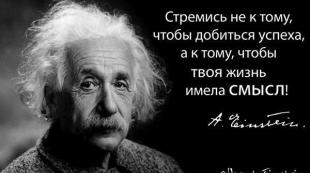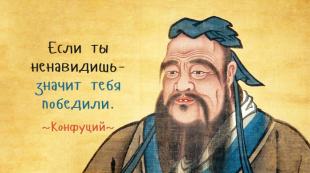Analysis of the poem "To be famous is ugly" by Pasternak. Analysis "To be famous is ugly ..." Pasternak To be famous is ugly parsnip epithets
The poem "To be famous is ugly" is his programmatic work: in it the author expresses his thoughts about what a creative person should be, describes his views on literary creation... Using brief analysis“To be famous is ugly” according to the plan at a literature lesson in grade 9, you can easily and easily explain the essence of these views to schoolchildren.
Brief analysis
History of creation- Written in 1956, it was included in the collection of poetry "When he clears up", along with other works written by Pasternak in three fruitful years.
Poem theme- the essence of creativity and the code of the poet's life.
Composition- the work can be divided into three thematic parts. In the first, the poet argues that the creator should not strive for public recognition, this is not the goal of creativity. The second part reveals an opinion about exactly how a poet should live, and in the last, final part of the composition, Pasternak says that following the code of life will eventually lead a creative person to literary immortality.
genre- philosophical lyrics.
Poetic size- complex, Boris Pasternak uses transitions from one size to another according to the scheme spondeus - pyrrhic - pyrrhic - iambic.
Metaphors – “leave gaps in fate“, “be a parable on everyone's lips“,
Epithets- “f life whole“, “live track“, “a single slice“.
Comparisons – “how the countryside hides in the fog“.
Antithesis - “ defeat - victory“.
History of creation
The poem “To be famous is ugly” was written after a whole series of events in the life of the poet - he was recognized, he became a member of the Writers' Union, the “leader of the peoples” died, but the general fuss about literature worried him less and less, Pasternak was mainly engaged in translations. At the same time, he pondered a lot about the essence of creativity, the result of these reflections was the hard-won truth, clothed in poetic form in 1956.
There is a hypothesis related to the history of creation that with this work, which without exaggeration can be called programmatic, Boris Pasternak demonstrated his rejection of the creative choice of Vladimir Mayakovsky, who at that time was considered the best poet of our time and an almost inviolable person.
The poet included the poem in his collection "When he clears up", which was filled with more than forty poems in the period from 1956 to 1958.
Topic
The general theme is the essence of creativity and the path of a creative person, its purpose, but Pasternak also reflects on death and life, on fate, on the goals of creativity in the broadest sense.
Composition
The compositional structure of the verse is quite simple - it is three-part. In the first part, the poet seems to be pouring a tub of ice water on the reader, talking about the creators, who are a parable on everyone's lips, meaning nothing at the same time.
The second part is a reflection on how a person should be. engaged in creativity - Pasternak sees him as a person who lives without imposture, but for the sake of eternity. He should leave his life as if behind the scenes, showing only the result of his creativity, and not his personality.
And the third part is instructions to other poets what needs to be done in order to remain in eternity, and not to acquire only momentary fame. According to Pasternak, for this it is imperative to be alive until the very end. At the same time, his instructions should not be taken with arrogant moral teachings - the poet himself always followed the commandments that are set forth in "To be famous is ugly."
The main motive of the work is cognition and search for oneself.
genre
This is a philosophical work, Pasternak's message to contemporaries and descendants, his lesson, where the poet himself acts as a mentor. He shows others the path that he himself considers to be true - not to recognition by his contemporaries, but to something distant and eternal. Parsnip uses complex transitions from one size to another, spondeus is replaced by pyrrhic, and that, in turn, is iambic. This allows him to freely express his thoughts without feeling constrained by the form. The rhyme is the same everywhere - cross.
Expression tools
Parsnip mainly uses verbs to convey movement, the poem is replete with adverbs - all this makes him very energetic. At the same time, the poet does not abandon classical means of expression, such as:
- Metaphors- "to leave gaps in fate", "to be a parable on everyone's lips",
- Epithets- "whole life", "living trace", "a single slice".
- Comparisons- "how the area hides in the fog".
- Antithesis- “defeat - victory”.
All means of expression are used as harmoniously as possible - they work to reveal the general idea. Pasternak has created a piece that is the perfect combination of content and form.
Poem test
Analysis rating
Average rating: 4.8. Total ratings received: 29.
The creative path of Boris Pasternak was very difficult and extraordinary. Today he is rightfully considered one of the brightest Russian poets of the 20th century. However, his most famous works, including the novel "Doctor Zhivago", which brought the author the Nobel Prize, parsnip wrote during the era of the formation and development of the USSR. Naturally, in order to become a famous writer in a country with a totalitarian regime, it was necessary to have not only a bright and original talent, but also to be able to hide their true feelings both in public and in works. The parsnip never managed to learn this, so it periodically fell into disgrace from the ruling elite. Nevertheless, he was popular, and his poems, novels and plays, which periodically disappeared from sale and were rejected by the censorship, were printed abroad and rewritten by hand. The author was really famous, but he was ashamed of being recognized on the street and in every possible way tried to belittle his own contribution to literature. However, not all Soviet writers behaved this way. Many of them, not having even a hundredth part of Pasternak's talent, considered themselves to be real geniuses and emphasized this in every possible way. Moreover, in those days, it was not so much a literary gift that was valued as a loyal attitude to the party's policy.
Among the creative intelligentsia, for all his fame, he had few friends. The poet himself explained this by the fact that he was not able to maintain warm and trusting relations with hypocrites and careerists. Those who were treated kindly by the authorities could afford to live in luxury, although from the pages of the newspapers they called on the people to equality and brotherhood. Therefore, in 1956, parsnip wrote his famous poem, which he addressed to colleagues in the literary workshop. After the publication of this work, which was included in the collection "When he roams around," many famous poets and writers simply stopped greeting Pasternak, believing that he had addressed his rhymed message to them personally. In fact, the author created a kind of code of honor for a writer, telling about how he sees a real poet or writer. In his opinion, modern writers should not worry about their creative heritage, create archives and “shake over the manuscripts”. Years will pass, and if these people were truly talented, then future generations of readers will appreciate it. If not, then carefully collected and sorted papers will forever gather dust in the museum and library storerooms, so unclaimed by anyone. The poet is convinced that "the goal of creativity is self-giving, not hype, not success." He urges his colleagues to “live without imposture,” that is, do not take other people's merits and do not try to look better in the eyes of others. According to the parsnip, life will put everything in its place anyway, and it will be much more important for posterity to know that the person whose works they admire was not a scoundrel. Therefore, the author is convinced that one must live in such a way as to "attract the love of space, to hear the call of the future." In addition, the poet calls on fellow writers “to plunge into the unknown and hide their steps in it”, and not to revel in power, money and prosperity, which predetermine fate and deprive a person of that spark in creativity, which is called talent.
Knows that history is created by people and interpreted by them for the sake of their own interests. Therefore, he is convinced that everything is relative in this world, and you should not revel in your achievements, which can be perceived in a completely different way after many years. The author believes that a real poet should not distinguish between “defeat and victory”, because time will judge everyone in its own way anyway. And the only value, which is an absolute value for Pasternak, is the ability to “be alive” to the end, i.e. be able to sincerely love, despise and hate, and not portray these feelings to please someone in their works.
Which attracts attention with the extraordinary brightness of her talent. His poems are of interest to many intellectual minds and are extremely popular. Many lines of his immortal creations have long become quotations. The analysis of the poem "To be famous is ugly", given in this article, will be of interest not only to literary scholars, but also to everyone who is interested in
The state of the lyric hero
He is very tense, but he is sure that he is right. The lyrical hero Pasternak is looking for the truth in this world and comes to certain conclusions only through his own experience. A true creator is always a pioneer. He creates something that will later serve as a dear to a large number of people, lead them to a new understanding of the truth and the world around him.
The lyrical hero does not rush about, does not get lost in conjectures, he is completely calm and confident in himself. Of course, it took him quite a long time to go all the way from start to finish and come to become an artist. The fate of any creative person is associated with torment, eternal spiritual search, service to art.
Let's try to analyze. "To be famous is ugly" (a poem by Pasternak) is intended to show the soul of the poet with his conflicting feelings. Like any creator, he is constantly in search of his place in the world. This is what Pasternak is talking about to his readers.
"To be famous is ugly": analysis
In this lyric work, the author touches on several topics related to the process of creativity and human existence in general. Success and fame, in his opinion, are transitory. It is unacceptable to set these components as a goal, otherwise real creativity will fade, turn into simple making money. An artist must not cultivate greed and self-interest in himself, he must be sincere and truthful.

If it is forgivable for a common man in some way to have a certain propensity for profit, then for a poet such a "hobby" may turn out to be fatal. Any creative person has a very vulnerable soul. Lies and deception destroy her, deprive her of a sense of self-sufficiency and peace. What conclusions does the analysis allow us to draw?
"To be famous is ugly" emphasizes the great role of the poet in public life, defines his place in the universe. The artist always paves the way for the future, he does not live in the present, and therefore he is never satisfied, completely satisfied. This the main idea, which is emphasized in the poem Pasternak "To be famous is ugly." The analysis of this lyric work is aimed at revealing the essence of creativity.
What does a poet live for?
The purpose of the artist of the word is different from that of most people. Every creative person has an ability that allows her to feel and perceive things that a common man in the street simply would not pay attention to. The Creator is always sensitive to what is happening, for him there are no unnecessary trifles. A poet should not constantly engage in too mundane things, otherwise he will lose himself. It takes him more time to be alone with his own infinite essence and to realize the significance of everything that happens. Otherwise, any artist is doomed to endless torment and suffering.

Truth is of the highest value to him. For the sake of the truth, he is ready to endure temporary hardships, to go towards his goal. Freedom is the poet's guide. You can't do without it. Only by remaining free can a poet create and move forward to new achievements. The analysis "Being famous is ugly" shows how difficult and unusual a creative person is.
The poet's aspirations
This is how all artists are arranged that they necessarily see the meaning of their life in serving the will of the Almighty as much as possible. Such a person, more than anyone else, is connected with his inner essence, therefore he has a well-developed intuition. The lyrical hero considers dedication to be the goal of creativity. He talks about the importance of staying alive until your very last breath.

It is important to live this life with dignity, not adjusting to circumstances and not trying to play any role. It is necessary to remain yourself and go all the way to your own achievements. Only then will a person be truly happy. The analysis "To be famous is ugly" demonstrates the task of any artist on earth - to seek the truth in everything and live according to the laws of conscience.
Instead of a conclusion
Thus, the meaning of the poet's stay on earth is not to preserve himself as long as possible, but to correctly and usefully spend his inner creative forces. The potential inherent in the artist can serve for the benefit of other people, show them the right path. Pasternak's "To be famous is ugly" shows the depth of feelings and experiences of a true creator who always lives on the brink of his capabilities and is surrounded by contradictions.
The surrounding life for an artist is not only a source of inspiration and an object of aesthetic interest. She is illuminated by his moral feeling, and she, in turn, conquering the artist, generates and strengthens this feeling in him. Pasternak always had an artist as a "hostage", but also a "debtor", given to the end to art. Awareness of the singularity, the chosenness of the poet's fate is also characteristic of the late Pasternak. It is multiplied by life experience, deepened by analysis and therefore truly impressive. It emphasizes and puts forward the moral aspect - the idea of the artist's responsibility to the whole world, to art itself and directly to people.
The deep organic nature of the theme of duty and service is confirmed by Pasternak by a variety of variants of its expression. She appears in the logic of cultural, historical and evangelical assimilations - in the poem "Hamlet". Or it appears suddenly, on the crest of a free and wide lyrical wave, in "Earth". Or - rather unusual - it has acquired the character of almost a maxim in the poem "To be famous is ugly."
The poem "To be famous is ugly" was written by the recognized master during the period of his "last songs". It conveys the poet's inner perception of his role, the very essence of his being on earth.
Late Pasternak is academic. He sparingly spends the artistic means that are in his arsenal, but this does not make his poems drier, but only emphasizes the skill of the poet, true to his image of the world, which is different from what was offered by Soviet literature:
It's ugly to be famous.
This is not what lifts up.
No need to start an archive,
Shake over the manuscripts.
In this poem, Pasternak opposes his creative path to the path of Vladimir Mayakovsky, who was immoderately glorified after Stalin declared him "the best poet of our time." Well, the leader needed a "court" poet, who would carry the ideological attitudes of modernity to the masses, and by the will of fate, his choice fell on the famous futurist. And Pasternak was averted by the fate of the "famous" that befell Mayakovsky, he did not think of life outside of mystery and imperceptibility, and he always separated true poetry from the bustle of literature.
Let's note for now: a poet, as Pasternak believed, is contraindicated to be famous, "to start archives", success is destructive for his talent
and hype. In addition, the love of the public is fleeting, sometimes unfair, and often fashionable. The poet, of course, creates for people; this is precisely the essential meaning of any creative act. But precisely, for and in the name of people, and not for the sake of their enthusiastic assessments, and even more so not for the sake of pleasing the tastes of those in power. Parsnip refers to fame as to worldly vanity, his art is akin to the mercy of celestials, who give people good without demanding anything in return. The poet feels joy from creativity itself. It is his element and way of being. He cannot but compose, for him it means living, pouring out his soul in sounds, filling the world with beauty.
The poet formulates the maxim: "The purpose of creativity is self-giving." In the first place for Pasternak is the highest sensitivity, responsiveness to moral impressions, and not the transformation of life into the life of a poet. Actually, in the later poems of Pasternak, with their lofty, preaching statement of duty, a decisive activation of the “I” is visible, no longer so much an eyewitness of the world process as its direct accomplice. And in the poem "To be famous is ugly" this activation is brought to the limit. In the subtext of the poem - all the same striving for unity, characteristic of Pasternak, but, being complicated by the feeling of incomprehensibility - the subjective moment in the poem is obvious - it expresses itself not directly, but from the opposite, through conflict. All this introduces new accents into the artist's philosophical and aesthetic concept, but does not destroy its foundations - the assertion of unity with the world as a life-giving and moral-forming principle.
In general, the poem requires a thoughtful reading in the context of Pasternak's entire lyrics, its thematic features, philosophical orientation, and specific features. How dangerous it is to draw conclusions about the works of a great poet, how difficult it is to penetrate into his artistic world, is evidenced by Mandelstam's presumptuous opinion, according to which “Being famous is ugly” “sounds like an official report”. Mandelstam was mistaken: what is missing in the poem is "formality", rather, it creates the impression of a teaching message, but confidential, sincere, honest, like a sincere conversation of good friends.
Pasternak's attention is drawn to the signs of colloquial speech: "shake over the manuscripts", "be a parable on everyone's lips", "in the end", "not to see a single zgi", "a span of an inch." The poet uses phraseological units and vernacular phrases, which convey a special expressiveness of speech with a small volume of words and convey colloquial intonation.
There is one more important aspect of the interpretation of the poem. Despite the fact that the extraordinary eight verses cannot be correlated with any specific passage of Holy Scripture, it should be noted that they, like the entire text, consist of biblicalisms. "To be famous is ugly" in content and poetics is focused on the Gospel apostolic epistles. Pasternak, a deeply religious person who fell into the trap of atheistic Russian literature of the Soviet period, nevertheless remains true to his moral principles and religious convictions and formulates those moral laws and ethical dogmas, without which the life of a true artist cannot be imagined.
Boris Leonidovich Pasternak is a poet-philosopher, a thoughtful artist who gazes with interest at the life around him. The inquisitive mind of the poet wants to penetrate the very essence of things, understand them and tell the world about his discoveries. In fact, the poet sums up his work with the poem "To be famous is ugly." But taking stock does not mean putting an end to it. The last book of lyrics is not the end of Parsnip's poetry, always directed towards the future, tuned in to the perception of his call:
Others on the live track
Will go your way by an inch of an inch,
But defeat from victory
You yourself must not distinguish.
A true artist is always a pioneer. Others will follow him, perhaps without even remembering whose footsteps they are following. But can this really have any meaning for a poet who gives himself up to creativity wholly, without a trace, assimilating in self-sacrifice to Jesus Christ, who performs the feat of the Cross? It’s hard to live like that, sometimes it’s unbearable, but such is the fate of the poet. Only then is a masterpiece of art born, when the human soul is alive, when it is open to the world and to people:
And should not be a single slice
Do not step back from the face
But to be alive, alive and only,
Alive and only to the end.
This is how Pasternak's poem ends, and his final book of lyrics is imbued with the same moods. This is his last - no, constant, everlasting and forever living - a poetic word.
"To be famous is ugly ..." analysis of the work - theme, idea, genre, plot, composition, heroes, problems and other issues are disclosed in this article.
Lyric poem by Boris Pasternak "To be famous is ugly ...", ironically, as famous as the author himself. The long-established aphorism, the first line is an example proving how important it is to start literary work instantly grabbed the reader and made him eagerly read the text on to the very end. In fact, already in the first line of his programmatic poem, the author formulates an artistic and personal position, which is very unusual for a poet. After all, it is known that people of creativity at all times desperately needed understanding and success. Often those who doubt everything, it is thanks to their enthusiastic attitude towards themselves that they understand that they are not doing in vain. However, Pasternak clearly delineates the concepts "Hype" and "Love of space" ("Future call"). This is the main antithesis poem, and it is intonationally supported by a cross rhyme.
The poet emphasizes: recognition, if it does come, should be a natural consequence "Dedication" in art, not "Imposture"... He seems to foresee the coming glory of the real creator:
Others on the live track
Will go your way by an inch of an inch,
- and immediately insists that the person "Must not distinguish" "Defeat by victory"... He needs a complete acceptance of everything that happens to him as a sign of fate.
Modesty and dignity - this is what Boris Pasternak teaches his reader. And it seems that at the same time he is addressing himself, his inner voice and possible impulses of ambition in his own soul. Is it so? … Let's see at what time and under what circumstances of the poet's life this poem was created.
Dated in 1956, the work was born in the late period of the life and work of Boris Pasternak. By this time, “the great leader of the Soviet people” I. Stalin, who was glorified by a romantic poet a few years ago, had already passed away. Already left behind is a short period of public recognition of Pasternak in the Soviet Union and membership in the Writers' Union. The poet moved away from the general bustle of literature and increasingly devoted himself to translating the works of foreign authors and risky activities to protect and support disgraced friends, among whom were Akhmatova and her son. A rethinking of the events of past years and his path entered the life of the writer, and in this sense, it would not be wrong to assume that "To be famous is ugly ..."- a reminder both to myself and to my fellow writers of the true values and, of course, to the readers, who, in fact, create a destructive hype around their idols.
Literary critics suggest that in this poem Boris Pasternak openly dissociates himself from the creative path of his other famous contemporary and in the past like-minded person - Vladimir Mayakovsky. By that time it was customary to praise him, without knowing the measure, as "the best poet of our time." The words belonged to Stalin, which for a long time determined the "immunity" of Mayakovsky, who had already become a cult poet in the eyes of the people. In this "court path" Pasternak saw a terrible danger for a creative person. And yet, the lyrical hero of his poem does not at all salivate with backbiting and does not hide in his words and intonations resentment towards the whole world for his own unrecognition.
In each phrase one can hear the realized and hard-won truth. This is a strict sermon addressed to those who have the divine gift to inspire and "Lift up" and who has forgotten or may forget their destiny on earth. "No need to start an archive, - the author writes, - Shake over the manuscripts "... And openly pronounces judgment
Shameful, meaning nothing
Be a parable on everyone's lips.
Some exaggeration of the denial of the gift in this case should work like a tub of cold water. This is the beginning of awakening from sleep, and it is compositionally expressed in the first two stanzas. Further, the author nevertheless turns to reasoning about what a poet should be like (both in the narrow and in the broad sense of the word).
A poem written in a complex, ever-changing poem the size(spondeus - pyrrhic - pyrrhic - iambic), has no external plot- only internal. This is the movement of the thought of the poet-philosopher from the denial of glory to the affirmation of the great power of the gift.
... leave spaces
In fate, not among papers.
Metaphor "Spaces" here the meaning of understatement takes on, motive to learn and finding myself, and the lexical repetition of the word "alive" convinces the reader of the need to strive for a spiritual life - "only"!









